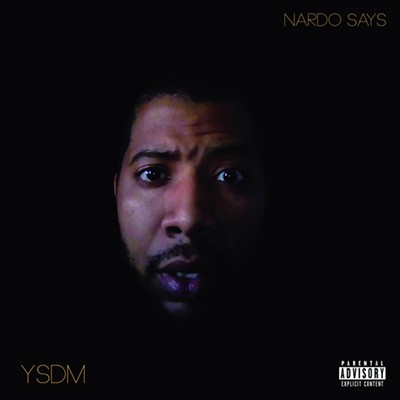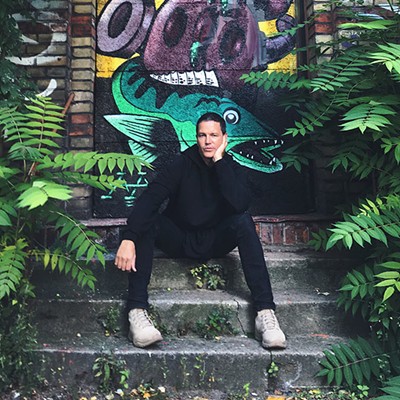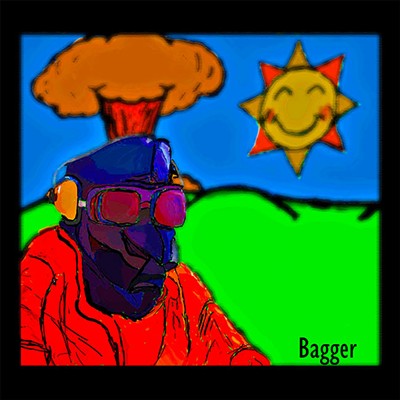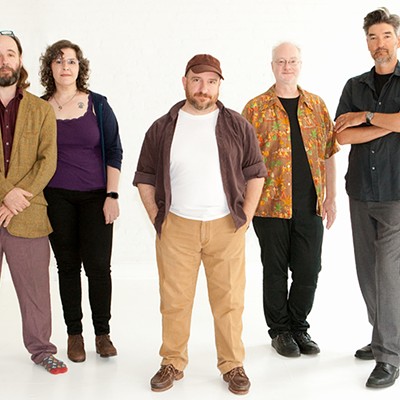Wednesday, July 20, 2011
Longer version: Interview with Black Francis
Below is a longer version of the interview we ran this week with Black Francis, a.k.a. Frank Black, of The Pixies fame. He plays a sold-out acoustic show at Club Cafe Saturday, July 22 at 8 p.m.
First, I want to ask about the upcoming album with Reid Paley, who played around Pittsburgh for a while. Everything I read about it makes it seem it was recorded pretty quickly. Was the idea to do an album also pretty spontaneous?
Yes, actually it was. It was extremely spontaneous. I was looking at [my] schedule and thinking, "I could do some recording in that town there for a couple days" -- which was Nashville. And I thought, "Well, I don’t want to do it all just myself, so I‘ll ask Reid if he wants to do some stuff." We got together in New York for a couple days and started it and then we finished it off there [in Nashville].
And does it alternate between songs written that you wrote and songs that Reid wrote?
We wrote them all together and we were singing them with the drive of The Byrds, I suppose.
The other release you have on deck is a Catholics boxed set. Where are you with that?
Well, it’s being put together and re-mastered. We’re just trying to figure out what shape of box it’s going in.
I noticed on The Pixies one that came out before it that the art work was very elaborate. Is it important that the boxed set itself be a new work instead of a compiling of back material?
No, the graphic artist guy was sort of known for his elaborate process, so the boxed set was of course very over the top. I would like to think I am taking some cue from him with regards to the new Catholics boxed set. I don‘t know it will be as over the top.
Do you have the same approach going through all the Catholics stuff as you did going through all The Pixies stuff?
I wasn’t very involved in compiling the Pixies stuff because it was all very established. With the Catholics stuff, all those tapes were in my possession and we had to go through them all and figure out if there was any bonus material in there. There was a little bit of work involved locating all the tapes, but I think we found everything.
Anything you’d like to note about rarities or stuff people wouldn’t expect to be in there?
There are other versions [of songs]. There are a couple of demos. There are some songs that were never released, so-called bootleg kind of things. It’s all going to be compiled in an alphabetical order as opposed to separated off by album. It’s going to be, like, the first vinyl will be A through H, and then it will be I through M, and like that.
So why that approach, as opposed to chronological order or something more ordinary?
I don’t know. I like alphabetizing things, as far as songs are concerned. I have done it occasionally on actual albums before. I’ve done it many times in set lists. On the one hand, of course, alphabetizing things is a way of organizing them so you can find it I suppose, if you are looking through a list or through a library for example. The other reason to alphabetizing something, as a list of works ¾ in this case, a list of songs you are potentially going to listen to, or a set list, if you are going to perform them ¾ it’s a way of randomizing the process, as opposed to trying to tease out some sort of dramatic arc of the material. It’s a way to be cocky. "I don’t need to create a dramatic arc to the material. I can randomize it by alphabetizing it and the drama will be there already." That’s one way of looking at it. Another way is a pop song is a pop song. A pop song is two to three minutes long and that is the entity. The song has a beginning and it has a middle and it has an end, and that is the currency we are working with.
That seems like a much different approach than you’ve had on some of the albums you have released in the last couple years. There are a lot of theme albums and a few centered around more esoteric subject matters. I’m surprised you’d make a statement like that, where the song is the song is the song.
It just depends on what kind of mood you are in. It’s not fun for me to always have the same process, the same parameter. Parameters are nice as a way to organize something. Sometimes you want to be really precious about something and want to carefully place each thing so that the listener can experience it a certain way. But sometimes it’s good to mash it all up and say, "Now you’re all going to just stand there in alphabetical order." It’s also a way to get more on one CD [on the boxed set]. I was trying to max out the CD, make sure each CD was 72 minutes of music, and it’s a way of looking at a body of work, too. We’re not putting all the albums in the way they were originally heard. Everyone’s already got that. This is a way of saying, "Forget about all those albums, look at the whole body of work." To me, organizing it alphabetically is a way to draw attention to the whole body of work as opposed to this thing we do called the LP, where we put a certain amount of it on the pedestal. An album represents cohesion. As for this boxed set, we are trying to represent everything in total so you have to get away from the whole LP thing.
The number of albums you have released in the last ten years, between soundtracks and new studio stuff and odds and ends collections, is staggering. I had trouble counting them. Why are you so prolific? Why so much stuff? Is it because of the ease by which music can be distributed that you can easily get all that staff out?
I think that’s the way of a so-called indie artist. There are some indie artists release very little material and spread it over a long period of time and there are others that are busy bees, that are always getting stuff out. That’s the way of a certain type of artists, I shouldn’t say it‘s a matter of indie versus mainstream. You can look at Prince, who I would not call an indie artist. When he was recording consistently, he was constantly bringing out records. Van Morrison probably has tons of tapes. He comes out with a record every year. I think there is a certain kind of artist. There are some people who work on a regular basis and there are others that devise it up. I just happen to release a lot of things.
Are you ever afraid that, by releasing so many things, each product will not get the notice it deserves?
I don’t really think anyone’s record "deserves" to get seen or heard. It’s sort of like, you deserve what you deserve, all you can do is play your best hand and if you are going to approach everything strictly from a marketing point of view, you could say it would probably do you well to release fewer records because that would work better with the marketing of music and the selling of music, but I am not that type of artist. It’s not that it’s an issue of integrity or anything like that. I like to sell music and it’s fun and I want to be successful because I like having money [but] I’m not interesting in pacing everything out so that I can maximize my sales every time I release something. And from an artistic point of few, I don’t want to sit around and think about this before I release it. I don’t want to release anything that might be not as good. There are some people who are really good self editors, I suppose, but I don‘t really work like that. I‘m not really interested in working like that. I feel like I already do a lot of self-editing in the creation process. I already go through a lot of self-editing, so to self-edit more doesn’t seem fun to me. It’s like painting pictures. I’d rather say, "I painted a bunch of pictures this summer! Here they are!" I don’t want to sit around and go, "Well…" Because then, you have to ask, is [the work] invalid? Is my last record less valid than the popular ones? I don’t know if it’s true. I don’t listen to music that way. Is Bob Dylan’s Self Portrait less valid than Blood on the Tracks? There are people who love Blood on the Tracks, the AllMusic guy, the Rolling Stone guy. You can read the writing of people who go on and on and on about Blood on the Tracks. Guess what? I don’t think Blood on the Tracks is that great! It’s not one of my favorite Bob Dylan records, but guess what? Self Portrait is! I love Self Portrait. Self Portrait is the one that got panned. People don’t even know what you are talking about sometimes when you mention Bob Dylan’s Self Portrait. Self Portrait is a really interesting record -- for me. It’s not invalid.
You are playing solo acoustic at Club Café. Would you like to give us a clue as to what songs to expect?
I don’t know what songs but I have decided to try to play at least one selection from every one of my formal LP releases, to get through the whole lot of them, as opposed a list of songs that I like to whatever. I am playing with [bassist] Eric [Drew] Feldman, so some of it will be dictated by what sounds good as a twosome.
You toured with The Pixies for a while. Will there ever be another Pixies record?
That is the $16,000 question, as they say. I don’t know if there will be another Pixies album or not. I am of that camp of people wanting one. I have fans all the time who are saying, "No, don’t do it. Don‘t mess with the legacy" or whatever. But I don’t know. I’m a working musician and I travel, so that’s kind of where I am coming from. Sometimes only playing material you recorded a really long time ago ¾ it feels a little limiting or something. It feels like there is not a new story to tell there. So far it’s going well. It doesn’t feel like I am in a golden oldies revue and it doesn’t feel like it’s being reviewed like that. We’ve been very fortunate in that we’ve been able to do so many years of touring on a back catalogue. Can it last another seven years of reunions? I don’t know.
[Note: Before I could ask the next question, the reception broke up and when Black called me back he used it as a chance to sing the chorus to "I‘m Not Dead (I‘m in Pittsburgh)," from his 2006 double album Fast Man, Raider Man, a song co-written by Paley.]
Will that be on the set list when you’re here?
I think the only time I’ve played it has been in Pittsburgh so it’s kind of a tradition. That’s really more of a Reid Paley lyric on that song. I wrote it with him and that’s a good song. I don’t really have any Pittsburgh connections, as Reid Paley [has], but in my own mind and in my own heart, I have my memories. They go right back to the early days with The Pixies, the late ’80s.
Can you tell me some of those memories? What sort of things come to mind when you think about Pittsburgh?
I remembering playing in some kind of side street club. It’s just a feeling when you get into Pittsburgh, too. You play there in the summer time and the grass, the weeds, are bursting through every crack in the sidewalk. Everything is growing, even though it is an urban landscape, even though it is an industrial landscape. It has this water and the bridges. The greenery is bursting through everything. And of course, if you are there in the wintertime it is freezing. It’s brutally cold and everything is dead and hard. Then it’s alive again. It one of those places that has one of those cycles.
Your work -- and a lot of the work of the first generation of artists that were deemed "alternative rock" -- always struck me as the triumph of substance over style. Do you think kind of approach permeates younger bands?
I don‘t want to get down on any contemporary acts or anything or any younger bands. There are some really good ones out there. Substance always wins over style. Style is kind of cool and I don’t want to criticize people who all do the same kind of style because then you wouldn’t have whatever, late-’70s ska bands or whatever, so style has a function on occasion but, for the most part it’s the substance that really wins. It’s bands that are caught up in themselves and caught up in their own thing. They are the ones that are really good. Sure, the Talking Heads may have been around the New York scene and they were around a lot of other pop-y new wave bands. But are there really a lot of bands that sound like the Talking Heads that are as good as the Talking Heads? There may be a lot of copycats. But are there a lot of Talking Heads-type bands? No, there is not. There is one band called Talking Heads and that’s the way they sound. They’re about substance. They are not about being part of the new wave scene.
Was that how you felt when alternative rock was taking off ¾ that the scene was not so important; it was still about the material itself?
I was less about the scene, especially the Boston scene, but certainly I was taking a lot of my cues from the previous generation. I would consider a rock generation to be about five years. The bands that I was taking a lot of my cues from when I started The Pixies were probably five years older than me. And that would be people like Gordon Gano of the Violent Femmes or Bob Mould of Husker Du or Sonic Youth. There is this little punk band called Angst that I was really into and these were all people who were a few years ahead of me and I was always buying their records and going to see them in the local clubs. So they were cut of a certain clothe.
Lastly, I wanted to ask about the ubiquity of the movie Fight Club. It seems The Pixies, for better or worse, lived out their initial lifespan without one instantly recognizable hit, but it seems "Where Is My Mind?" came to fill that role. That’s the Pixies song my dad knows. How do you feel about that?
I accept it. I accept it and everything that comes with it. There were not a ton of hits in the band, except for that track and maybe a few other ones.
Tags: FFW>>













